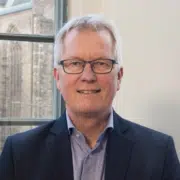Technologische weerbaarheid is cruciaal voor de nationale veiligheid en economische stabiliteit van Nederland. Onafhankelijk blijven van buitenlandse technologieën en zelf innovatieve technologieën ontwikkelen, sterken onze economie en autonomie. Dit is juist nu van belang in een wereld met toenemende geopolitieke spanningen en technologische afhankelijkheden. Het versterken van onze semiconindustrie en de bouw van een AI fabriek zijn voor de defensie-industrie onmisbaar. Met het investeren in technologische weerbaarheid benutten we onze kansen en krachten om competitief te blijven en te investeren in de banen van morgen.
De ministeries van Defensie en Economische Zaken publiceerden afgelopen vrijdag de strategie voor industrie en innovatie. Niet voor niets wordt deze koppeling gelegd. Eerder dit jaar toonde onderzoek van RaboResearch aan dat investeringen in defensiegerichte R&D gemiddeld tussen de $8,1 en $9,4 per geïnvesteerde dollar oplevert. Dit komt doordat defensie-innovatie vaak leidt tot baanbrekende technologieën, zoals radar, straalmotoren, het internet en GPS.
Wil Nederland sterk inzetten op technologisch leiderschap binnen sleuteltechnologieën, zoals AI en chips, liggen er nu kansen. Zoals de investering in een AI-fabriek. Een faciliteit die concrete impulsen zal geven aan het bedrijfsleven, innovatief onderzoek en de overheid. Het bevordert de doorgroei van Nederlandse start- en scale-ups, faciliteert de verwerking van gevoelige data binnen Nederland en draagt bij aan wetenschappelijk onderzoek. Urgentie is echter geboden om, in navolging van andere EU-lidstaten, vóór begin mei gebruik te maken van de hiervoor beschikbare EU-financiën. Bovendien kan de impact en reikwijdte van een investering mogelijk gezamenlijk met de regio Groningen verdubbeld worden door de koppeling met het European High Performance Computing (EuroHPC) initiatief.
Geen AI zonder chips
De Europese Commissie maakte in februari bekend 200 miljard euro te investeren in de ontwikkeling van AI. Hiervoor is een sterke chipindustrie een vereiste omdat aan alle voor AI benodigde technologische kracht, chips aan de basis liggen. Nederland heeft een bijzonder sterke positie met onze machinebouw en kennis over de integratie en ontwerp van chips in systemen. Die voorsprong moeten we koesteren en zo mogelijk versterken. Met de aanpak Beethoven zijn stappen gezet om randvoorwaarden als talentontwikkeling en woningbouw een impuls te geven. Nu is het van belang ook de innovatieprogramma’s zelf te versterken. Anders staan er straks huizen, zijn er opleidingen en wegen, maar is de werkgelegenheid verdwenen. In het ChipNL Innovatieprogramma hebben 64 bedrijven en (kennis)organisaties uit de Nederlandse chipindustrie de krachten gebundeld en gewerkt aan een innovatievoorstel gericht op het duurzaam competitief houden van de sector. Een sector waar we als Nederland sterk in zijn en die voor de economie en de Nationale Veiligheid van grote waarde is. Nu is de overheid aan zet om naast de geboden private middelen een bijdrage te leveren.
Met een sterke chip en AI industrie wordt een belangrijk fundament voor de Nederlandse defensie-industrie gelegd. Deze week onderhandelt politiek Den Haag over de Voorjaarsnota, de bal ligt op de stip.
Auteurs:
- Marc Zegveld Managing Director unit ICT, Strategy & Policy bij TNO
- Naomie Verstraeten, Chief Innovation & Technology bij Brainport Development
- Paul Sinning, CEO van HCSS
- Ron Augustus, Voorzitter Raad van Bestuur van SURF




